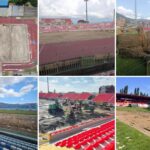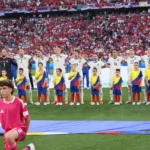COVID 19 AND ONE MONTH OD SILENCE | WORLD’S LONGEST NO FOOTBALL PERIOD

Not even the world wars managed to stop football as much as the coronavirus pandemic did – it is stated in an introductory to an interesting article of a Serbian sports daily “Sportski žurnal”.
While waiting for the ball to roll again and bring back football to the pitches all over Europe and the world, we are sharing with you this interesting analysis and research article, turning back the time and remembering the moments when football had to stop…
During the World War I football championships in Europe were played by Scottish, Austrians, Hungarians, Dutch, Finnish and Swiss. In South America, not only they continued to play their state championships, but they started a new one, the continent championship, in 1916 – Copa America.
After the Great War (1914-1918) football came to every corner of the globe, and the result was spreading of professionalism. In the period prior to the World War II football players in Europe and South America were already earning money so big that the best of them could not take part in the Olympic Games. In order to test their strength they decided to gather in Uruguay, in 1930; it was the first World Cup.
In 1939, when cannons resounded again and announced beginning of the Second World War, football had to reduce its volume, but somehow managed to get through many traps. English stopped the championship in 1939, followed by other countries, but national championships of many countries were played like nothing was going on.
Spanish did not play during their Civil War in the period 1937-39, but they continued afterwards and played without any interruption all until the coronavirus epidemic.
Italians stopped their Serie A when the Allied troops landed in Sicily in 1944. They returned to football already in 1945.
Football was stopped in Germany during the World War II, but only in 1944. The break lasted for three years. At the same time, German national team also played football. One of the matches was played against the Independent State of Croatia in Zagreb in 1942.
France, Hungary, Portugal, Denmark, Faroe Islands, Iceland… also did not want to give up football.

Football was played in Serbia too, all till 1944. City championships were played, but also humanitarian matches. Original “eternal rivals” BSK and SK (Yugoslavia) played a match before 15,000 spectators in Belgrade, on Easter of 1943. Money from the ticket sale was used for food and medicine for the prisoners in German concentration camps.
By entering the war, Germany gave up the bid for organization of the 1942 World Cup, applied for six years earlier, at the FIFA Congress in Berlin in 1936. Brazil tried to use the opportunity and submitted the bid application to host the 1942 World Cup.
However, FIFA decided to cancel staging of the World Cup during the war and the tournament host was not nominated. They showed appreciation to Brazil by awarding them the first World Cup after the war, in the year of 1950. The war did not stop South America to stage four continent championships (in 1939, 1941, 1942 and 1945), and national championships were also regularly staged.
Europe also managed to weather the hardships, and it is important to say that the past month has been the longest no football period the world faced since the ball crossed the La Manche. At the moment, Belarus is the only European country carrying the torch.

FOOTBALL CACELLED IN HUNGARY AND YUGOSLAVIA
After the World War II, two national championships were cancelled in Europe due to armed conflicts.
Soviet Union invasion of Hungary in the fall of 1956 caused cancellation of the football season. The very championship was stopped pretty early, so Vasas SC, leader on the table for eleven rounds, was left without the title.
NATO aggression that started in March 1999, and consequent declaration of martial law, stopped the Yugoslav championship after 22 played rounds. The aggression lasted for about three months, it was ended on 10th June and since there was no more time for the championship to finish, the final decision was to declare the situation “as found”, so the title went to FK Partizan, the first ranked team on the league table at the time.




